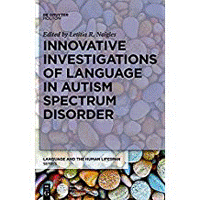“Innovative Investigations of Language in Autism Spectrum Disorder”

“Innovative Investigations of Language in Autism Spectrum Disorder”
Edited by Letitia R. Naigles
American Psychological Association
Washington, D.C., 2017
Authors provide insights about language’s role in ASD
Reviewed by Kerry Morrison, Psy.D.
As any clinician can attest, the diagnoses of neurodevelopmental disorders such as Autism Spectrum Disorder (ASD) have been on the rise for the last 10-20 years. What was once a very uncommon diagnosis for those working with children in outpatient or school settings, has now become a mainstay.
Yet, the understanding of the ASD diagnosis and how language fits into it is a hotly debated issue among practitioners and researchers alike. This edited book takes a fresh look at this very issue and provides new insights into the role of language in both the diagnosis and the clinical understanding of ASD.
“Innovative Investigations of Language in Autism Spectrum Disorders” begins by discussing the significant changes that were made to the diagnosis. In the current edition of the Diagnostic and Statistical Manual of Mental Disorders-5, the clause “deficits in language and communication,” were dropped from the criteria for ASD, leaving only deficits in social communication.
In the International Statistical Classifications of Diseases and Related Health Problems (ICD-10), the diagnosis was not changed, but deficits in language and communication are no longer required symptoms for the diagnosis. The text describes how the deletion of this criterion is a game changer in the field for those who research and treat ASD.
The major premise of this volume is that language impairment has long been thought to be a core component in determining ASD along with deficits in social interaction and restrictive and repetitive behavior.
The authors insightfully discuss that with the removal of deficits in language and communication from the two primary diagnostic and classification manuals (DSM-5 & ICD-10), clinicians have been divided in their thinking about how language in a broad sense, factors into our working knowledge of ASD or the standard diagnosis of childhood autism.
Clinicians are aware of the enormous variability in language in those diagnosed with ASD, ranging from intact language to severe deficits and delays. Therefore, there is incredible heterogeneity in the role of language in ASD.
The aforementioned manuals focus on the deficits in the social uses of language such as nonverbal behaviors in social interactions, (specifically eye contact, facial expressions, posture, body language and gesture), views language as communication in a broader context.
This muddies the waters for many clinicians who are struggling to make diagnostic distinctions between ASD versus speech and language disorders that are separate from ASD. The book provides a more in depth look at making those differential diagnoses.
This current publication presents a new wave of research, theories and methodologies into the role of language in ASD. The authors are experts in communication disorders, developmental disabilities, clinical psychology and theoretical linguistics.
They raise many interesting concepts that add to understanding the puzzle piece that language plays in ASD and in developing a social pragmatic framework for treatment.
This book can be a useful primer for clinicians – beginning and seasoned, as well as educators. It fully addresses a highly disputed topic in contemporary psychology.
Kerry Morrison, Psy.D., is a psychologist for the Department of Developmental Services in the Central/West Region of Mass., who also has a private practice, consults, teaches and provides training on a range of mental health topics.
Learn more about the book: Innovative Investigations of Language in Autism Spectrum Disorder (Language and the Human Lifespan (Lhls)) (2016-10-26)
